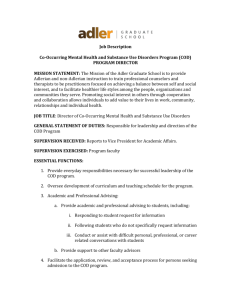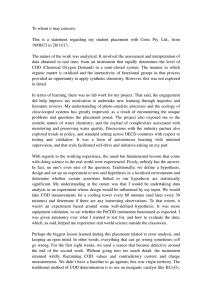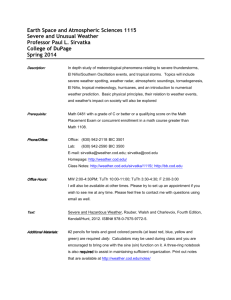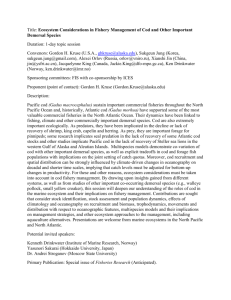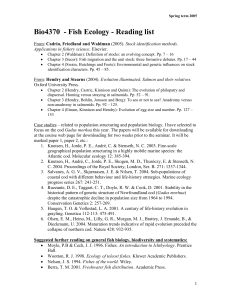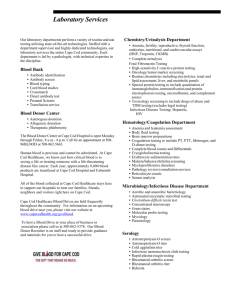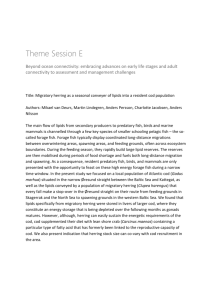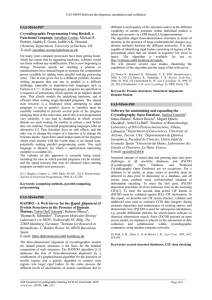Learning from Cash on Delivery Research to Accompany a Pilot
advertisement
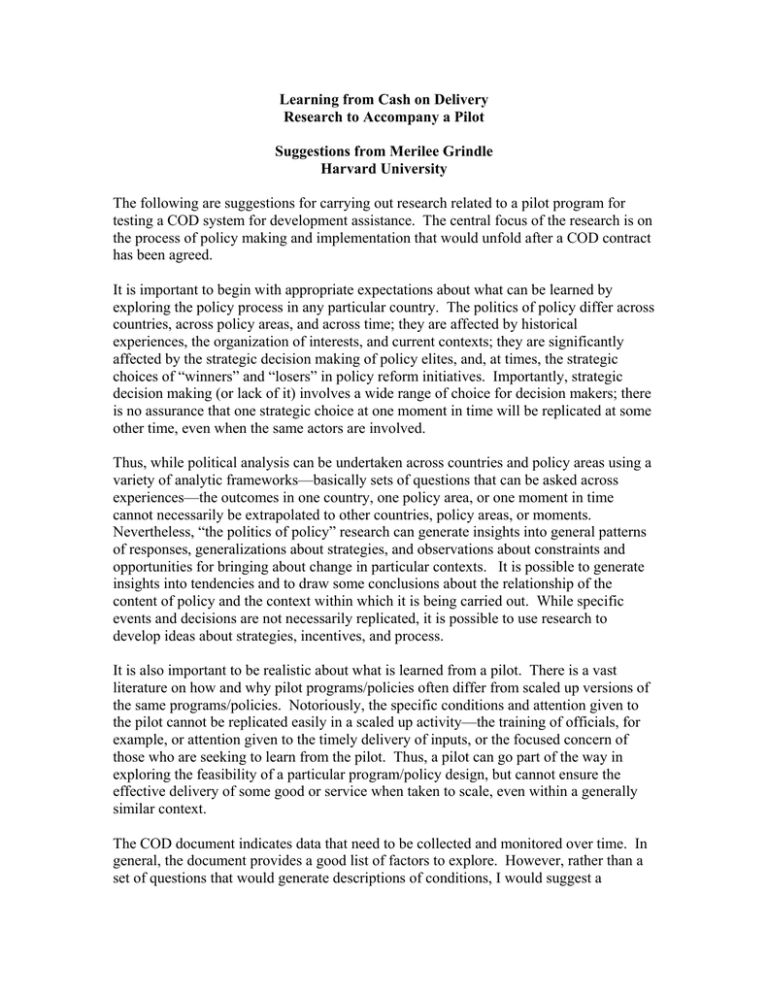
Learning from Cash on Delivery Research to Accompany a Pilot Suggestions from Merilee Grindle Harvard University The following are suggestions for carrying out research related to a pilot program for testing a COD system for development assistance. The central focus of the research is on the process of policy making and implementation that would unfold after a COD contract has been agreed. It is important to begin with appropriate expectations about what can be learned by exploring the policy process in any particular country. The politics of policy differ across countries, across policy areas, and across time; they are affected by historical experiences, the organization of interests, and current contexts; they are significantly affected by the strategic decision making of policy elites, and, at times, the strategic choices of “winners” and “losers” in policy reform initiatives. Importantly, strategic decision making (or lack of it) involves a wide range of choice for decision makers; there is no assurance that one strategic choice at one moment in time will be replicated at some other time, even when the same actors are involved. Thus, while political analysis can be undertaken across countries and policy areas using a variety of analytic frameworks—basically sets of questions that can be asked across experiences—the outcomes in one country, one policy area, or one moment in time cannot necessarily be extrapolated to other countries, policy areas, or moments. Nevertheless, “the politics of policy” research can generate insights into general patterns of responses, generalizations about strategies, and observations about constraints and opportunities for bringing about change in particular contexts. It is possible to generate insights into tendencies and to draw some conclusions about the relationship of the content of policy and the context within which it is being carried out. While specific events and decisions are not necessarily replicated, it is possible to use research to develop ideas about strategies, incentives, and process. It is also important to be realistic about what is learned from a pilot. There is a vast literature on how and why pilot programs/policies often differ from scaled up versions of the same programs/policies. Notoriously, the specific conditions and attention given to the pilot cannot be replicated easily in a scaled up activity—the training of officials, for example, or attention given to the timely delivery of inputs, or the focused concern of those who are seeking to learn from the pilot. Thus, a pilot can go part of the way in exploring the feasibility of a particular program/policy design, but cannot ensure the effective delivery of some good or service when taken to scale, even within a generally similar context. The COD document indicates data that need to be collected and monitored over time. In general, the document provides a good list of factors to explore. However, rather than a set of questions that would generate descriptions of conditions, I would suggest a process-oriented approach, in which researchers follow the path of a particular reform initiative. Responding to the COD document questions is likely to result in a static description, and often can result in a long list of deficiencies in the institutions and systems that are involved in policy—from which it is difficult to learn what particular factors, if changed, might make a difference in the outcome. Instead, a process approach encourages more analysis of the context within which policy initiatives are being carried out and the way in which strategic decisions advance or hinder a reform initiative. Thus, while the kind of information outlined in the COD document is important to have, I would suggest acquiring it through a process-tracing approach. Researchers are likely to learn more about the actual conditions and the dynamic way in which organizations behave through process-relevant data collection. A process approach puts emphasis on what happens as a program or policy makes its way from an idea to a place on a policy agenda, to a design, to a set of activities involved in negotiation, approval, redesign, etc., to initial implementation of a new initiative, to its on-going implementation. Relevant questions are: Who took the initiative (to set up a meeting, to write a policy proposal, to suggest a change, etc.)? Who was involved in this discussion? When was the decision made to do X? Why was X rather than Y decided? Then what happened? Why did that happen? Then what happened? And so on. Some concrete suggestions for how to proceed: First, researchers focused on a reform initiative process need to be acquainted with the political context and history of the particular country whose experience is being explored. This does not necessarily mean that researchers need to be from the country in question, or those with very deep research histories in the country, but they should be familiar with the general political economy, structure, and history of the country. Among political scientists who study comparative politics, for example, this kind of knowledge base is widespread with regard to particular countries or regions. Second, process-tracing research requires access to decision makers and implementers. Thus, access needs to be negotiated in advance of the pilot or the researcher should be someone with credibility and good connections within a country or a particular policy area in a country. Often, academics within a country have good appreciation of general political economy and specific activities related to the policy area in question and can provide a useful source of information as research is initiated. I have also often found the technical teams who work on policy design within particular ministries to be good observers of local political contexts and those who can provide good insights into what is happening and why within a process. Third, hypotheses such as those presented in the COD document require a comparator— presumably a generally analogous situation of policy reform initiatives in which a COD contract does not exist. For example, to explore the hypothesis, “As a result of the pilot, the government involves more ministries in developing a strategy for reaching education targets,” a roughly analogous situation—such as a similar policy reform initiative undertaken in the past—could be explored. This kind of “baseline” research involves identifying one or two previous policy reform initiatives and then, through interviews with the principal actors and the review of relevant documents, “reconstructing” the process of policy making and, if possible, of policy implementation. Thus, in education, it would be important to identify who was involved in the earlier initiative(s), who made the important decisions, with whom they worked and consulted, what actions they took, what procedures they observed, and how they sought to manage opposition, mobilize support, and encourage effective implementation. While this kind of comparison would always be subject to the particularities of each situation, it does at least provide some basis for demonstrating (if not proving) that the COD generated a distinct policy process. Alternatively, it might be possible to imagine some kind of “natural experiment” by observing a policy process being undertaken in the same sector but outside of the COD contract. The COD research can proceed without the comparator, but would require a different set of hypotheses, one that does not rely on establishing that the COD encourages “more” or “less” of some activity. Fourth, a thoroughly developed research project on a COD experience might usefully establish a baseline of initial expectations about the new initiative. This would involve interviews prior to the pilot with important actors in the policy process. For example, for an education reform, it would be useful to understand the initial perspectives of the minister of education, the minister of finance, various vice-ministers, lead administrators, the technical and bureaucratic units/teams that will be involved in formulating policy and regulations, the leadership of the teachers’ unions, and even a small sample of teachers. The purpose of such interviews, which are most appropriately open-ended, would be to explore initial understanding and expectations about the specific COD program. “What do you think of this idea for improving education? Does it seem feasible to you? What problems would you expect this new set of activities to encounter? How would you anticipate that “your people” will respond to this new initiative? Although this kind of research is not essential to exploring the hypotheses presented in the COD document, it would provide an added possibility for exploring how expectations may be altered through the introduction of the pilot. This would generate some insight into the utility of the various kinds of incentives that are embedded in the new program. With this assessment of knowledge and expectations for the new system, the remainder of a research project would involve process tracing. As indicated above, from the initiation of a COD contract, researchers would need to be asking, “And then what happened? And what happened after that? And after that?” It would be important to acquire information about who is involved in discussions, what decisions are being made in what arenas, how information is being conveyed, and a variety of other process-related issues that would make it possible to reconstruct the unfolding of the reform initiative. This kind of information is best acquired through interviews with the important actors in the process. Researchers would need access to these individuals and as much as possible, a “low profile” ability to check in with them on a regular basis to explore what is happening. Clearly, interview responses are always subject to perceptions of the individuals being consulted. In this kind of research, however, interviewing as many of the important actors as possible, plus keeping track of a trail of documents, allows for triangulation of responses for a reasonable approximation of what has happened and why. The most difficult part of the process to follow will undoubtedly be implementation. Effective implementation of education policies, for example, involves many actors (administrators, teachers, teachers’ unions, teacher training institutions) at many different levels (national government, state and local government, school district, schools, classrooms, communities) and any of these actors and levels can be responsible for how the intent of policy is or is not translated into its application. To deal with this difficult part of the policy process, researchers might adopt distinct research methodologies. First, they should continue to follow the implementation process link by link (for example, from a central administrative unit to a state level ministry to a unit responsible for execution to school directors to teachers to community engagement). In addition, after the policy has been in effect for some period of time, it would be useful to carry out a survey of school directors and teachers. The purpose of the survey would be to generate data on the understanding and actions of these actors as they carry out their regular duties and as they have been expected to implement new education strategies put in place as a result of the COD process. ¾ Important note: Research on the policy process should focus on important actors and organizations. I stress this point because of the popularity of the idea of “stakeholders” in the development assistance community. Stakeholders are understood to be those affected in one way or another by a policy or program change. Yet in most political systems, not all stakeholders are actors, i.e., those who play important roles in making decisions and determining the ways in policy changes are introduced and implemented. In education, for example, children and parents are stakeholders. In many countries, however, they are fully absent from the policy process and essentially have no voice in what occurs in the sector. Individual teachers may be stakeholders; teachers’ unions are more likely to be actors. While we may criticize this reality, it is reality that needs to be observed. In many countries, but very characteristically in developing countries, decision making tends to be somewhat closed and top down, even in countries that have democratic institutions. In assessing real world policy initiatives, it is important to focus on the activities of those who have leverage and the capacity to shape the process. From this perspective, it is possible also to observe “who is not at the table when important decisions are made” and gain added insights into power relationships. ¾ Organizations are complex systems that channel and shape the activities of individuals. They allocate roles and power relationships. Thus, researchers taking on analysis of policy processes need to be able to assess individual actors and their actions, as well as understand the organizational context within which they work. One reason for using open-ended interviews as a principal methodology in process-tracing research is that responses are specific to roles within the process and they generally involve description of the limitations and opportunities that the respondent faces within the organization. In processtracing, the organization can be either an actor or a context within which action is carried out. ¾ Institutions are rules of the game that shape actions and affect strategic decision making of individuals and organizations. In process-tracing research, institutions are an important part of the context within which actions are taken. In the “real world” rules of the game are generally revealed through actions and strategic decision making—because so many rules tend to be informal and because formal rules are often not observed, it is better to “discover” them through processtracing (for example, the reasons why particular courses of action are taken) rather than through a more general descriptive approach (such as enumerating the constitutional rules that affect the relationship between the executive and the legislature).
